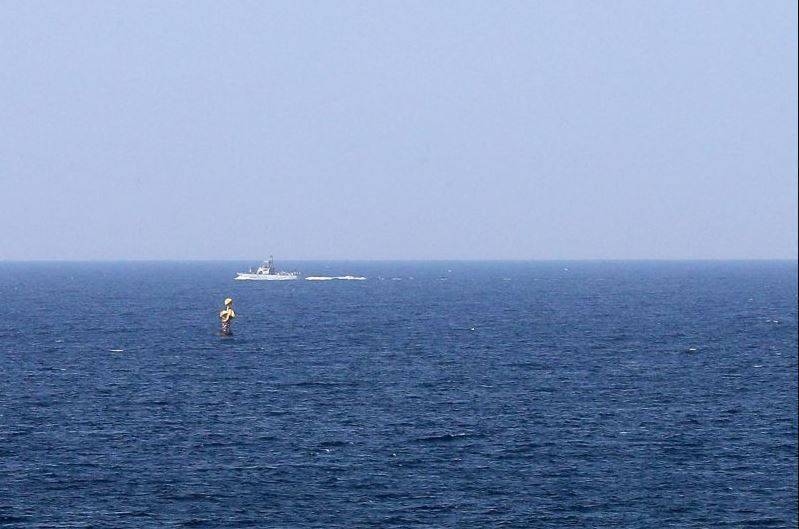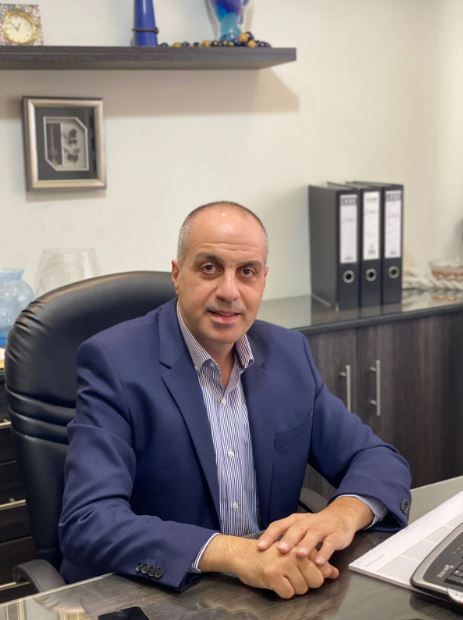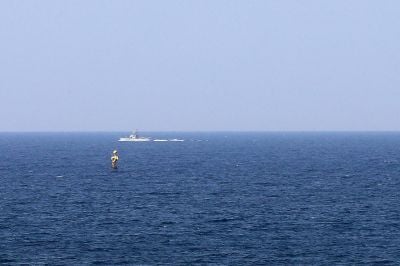
An Israeli military ship on patrol on Oct. 3 off Naqoura, near the "line of buoys." (Credit: Mahmoud Zayyat/AFP)
A formal agreement on the Lebanese-Israeli maritime border is imminent.
On Tuesday, Israeli Prime Minister Yair Lapid announced the two states had reached a "historic agreement," as submitted by US envoy Amos Hochstein. In a crisis-stricken Lebanon, the promise of the forthcoming exploitation of hydrocarbons would be an undeniable sign of hope, maybe even recovery.
But what does the signing of a maritime border agreement mean in concrete terms? When will Lebanon be able to start exploiting its hydrocarbons, should the Qana field prove to be rich in gas? Charbel Skaff, an energy expert, university professor and Ph.D in international relations, answers L'Orient-Le Jour's questions:
What explains this impression of a happy ending in the delimitation of the maritime border?
In the case of the negotiations, it is not the details that have prevailed, nor the Israeli-Lebanese wishes, but the negotiating dynamics of the American administration, which has exerted major pressure on Lebanon and on Israel to reach an agreement. President Joe Biden wants an agreement at all costs before the Israeli legislative elections, scheduled for Nov. 1, 2022.
Biden even contacted the Israeli Prime Minister, Yair Lapid, to express his determination. An electoral victory for former Prime Minister Benjamin Netanyahu could pose an obstacle to an agreement, as he is not in tune with Biden's Democrats. This expected détente could also coincide with progress on the Iranian nuclear issue.
 Charbel Skaff is a university professor, expert in gas and oil, and holder of a doctorate in international relations. (Credit: Charbel Skaff/Twitter)
Charbel Skaff is a university professor, expert in gas and oil, and holder of a doctorate in international relations. (Credit: Charbel Skaff/Twitter)
What kind of document will be signed and on what basis?
Regardless of what the Lebanese authorities say, we are moving toward a formal agreement on the delimitation of the maritime border between Lebanon and Israel. Although it will not be signed face-to-face, the statement that will be signed by both parties is equivalent to an agreement between the two states. It will be registered with the United Nations.
Only one point will remain ambiguous, however: the "line of buoys" — the five-kilometer area (2.5 to 4 square km) claimed by Israel, which begins on the coast at Point 31 (the starting point of Line 1, as claimed by Israel) and converges with Line 23. Israel insists on the "line of buoys" for security reasons. Its priority is to protect the tourist settlements of Rosh Hanikra (the Israeli side of Ras Naqoura). However, this area is also claimed by Lebanon as part of its Exclusive Economic Zone (EEZ). Lebanon claims B1, a point located in Ras Naqoura, as the starting point of its southern land border.
What does Lebanon gain from the negotiations?
Lebanon will get all the resources and revenues from the suspected Qana hydrocarbon field. This decision should be mentioned in the agreement. Since this field is intersected by Line 23, Lebanon will exercise its sovereignty over the northern part of the field. Israel, on the other hand, will exercise its sovereignty over the southern part of the field. And since [Lebanon] wants nothing to do with Israel, the question of remunerating [Israel] will be dealt with between the latter and the gas giant TotalEnergies, charged with the exploitation of Block 9 (in the framework of a consortium including the Italian Emi and the Russian Novatek, whose shares have been recovered by Lebanon).
On a larger scale, what are the benefits for Lebanon?
The delineation of the southern maritime border will bring stability to Lebanon's southern border. The region will no longer be used as a pretext for regional military attempts. On the other hand, it will be a place of potential profit for Lebanon in the event of the discovery of hydrocarbons on a commercial scale.
Total is expected to re-launch the exploration of Block 9, and other companies are expected to submit their applications for the exploration of Blocks 8 and 10. In this context, American and Qatari companies could be encouraged to apply. The agreement is also expected to foster domestic Lebanese political stability. Strongly encouraged by the American sponsor, but also by France and Europe, this agreement could have positive repercussions on the progress of the domestic political compromise, in the context of the end of a [presidential] term and fear of a presidential vacuum.
Can we already hope for a revival of the Lebanese economy?
It is absolutely necessary to dissociate the issue of the delimitation of the maritime border from that of the revival of the Lebanese economy. The exploitation of hydrocarbons will not take place for several years. Moreover, we cannot hope to revive the Lebanese economy without the adoption of the fundamental and structural reforms expected, concerning governance, the budget or electricity in particular. Only then can we hope for a return to growth.
If an agreement is signed today, when can Lebanon expect to exploit its wealth?
If the agreement is signed today, it will take a minimum of three years, in the best-case scenario, to exploit Lebanon's hydrocarbons. It could take longer, between six and eight years, depending on the investment capacity of the companies involved. Geopolitical considerations related to the willingness to invest in the region should also be taken into account. The financial capacity of the Total company is well available. It is part of the French soft power. Its regional presence in Cyprus, Egypt and Lebanon, could be beneficial in more ways than one.
The first phase of exploration requires six to seven months. Its speed will depend on the determination of the French company, but also on logistical considerations, such as the launch of the ship that will dig the first well. It is only at the end of this first phase that Lebanon will know whether or not the Qana field contains hydrocarbons in commercial quantities and whether or not it will be able to consider the exploitation of its offshore wealth.
This interview was originally published in French in L'Orient-Le Jour.
